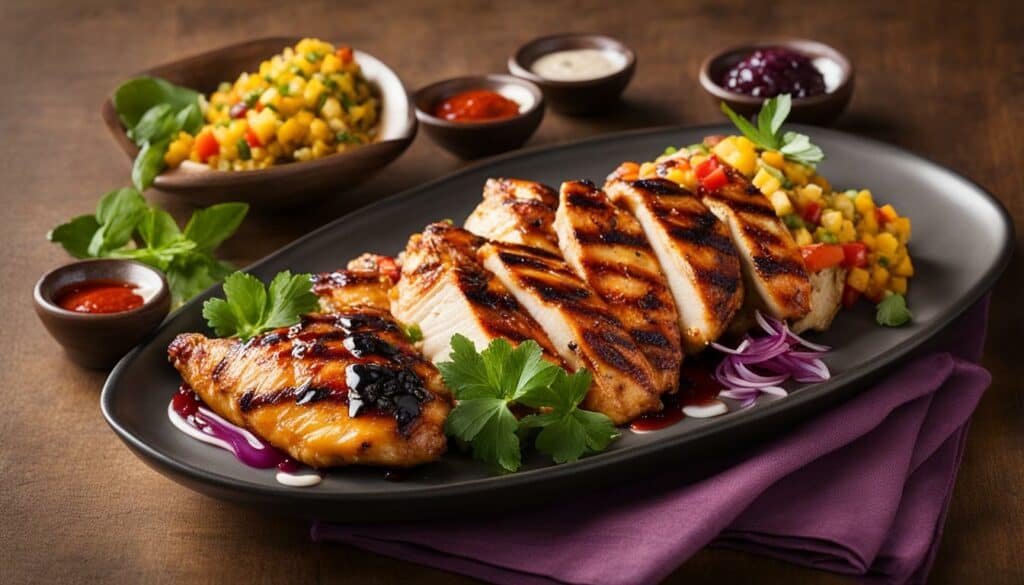Welcome to a world of culinary delight without compromising your health goals. This article will explore the wonderful realm of low calorie sauces for chicken recipes. These sauces are the secret weapon to transform your ordinary meals into extraordinary culinary masterpieces. Say goodbye to bland chicken dishes and say hello to flavor-packed, guilt-free indulgence.
Finding delicious yet low-calorie options can be a challenge when maintaining a healthy lifestyle. That’s where these sauces come in. They are designed to be enjoyed as part of a balanced meal plan, allowing you to savor the flavors without worrying about your calorie intake. With these sauces, you can have your chicken and eat it too, guilt-free.
Key Takeaways:
- Low calorie sauces for chicken recipes can elevate your meals without compromising your health goals.
- These sauces are designed to be enjoyed in a healthy meal plan.
- Flavor-packed sauces can turn ordinary chicken dishes into culinary masterpieces.
- Enjoying delicious sauces doesn’t mean sacrificing health and wellness.
- Experiment with the suggested sauce recipes and incorporate them into your meal planning.
Healthy and Flavorful Sauce Options

When it comes to low calorie sauces for chicken, there are plenty of healthy and flavorful options. By opting for sauces that are low in calories, sugar-free, and oil-free, you can add a burst of flavor to your chicken recipes without compromising on your health goals. These sauces are delicious and packed with nutrients to enhance your meals.
Condiments That Satisfy Your Taste Buds
When looking for low calorie sauce options, consider condiments that are low in fat, sodium, and carbs, while being high in protein and fiber. These attributes make them a perfect addition to your chicken dishes. From tangy vinaigrettes to zesty salsas, the possibilities are endless. Opt for homemade dressings using fresh ingredients to control the calorie content and customize the flavors to your liking.
By choosing low calorie sauce options, you can enjoy the taste and variety in your meals without compromising on your health or weight loss goals.
In addition to the traditional condiments, explore the world of international flavors. For example, try a spicy harissa sauce, which adds a fiery kick to grilled chicken, or a tangy teriyaki glaze for a touch of Asian fusion. These sauces provide flavor and a range of antioxidants, vitamins, and minerals that contribute to a well-balanced diet.
A Delicious Table of Healthy Sauces
| Sauce | Calories per Serving | Sugar | Fat | Sodium | Carbs | Protein | Fiber |
|---|---|---|---|---|---|---|---|
| Honey Mustard | 45 | 0g | 2g | 80mg | 6g | 1g | 0g |
| Balsamic Glaze | 30 | 2g | 0g | 5mg | 7g | 0g | 0g |
| Avocado Lime Dressing | 60 | 1g | 5g | 50mg | 2g | 1g | 1g |
| Spicy Peanut Sauce | 70 | 2g | 5g | 110mg | 4g | 3g | 1g |
These sauces add flavor to your dishes and provide essential nutrients. They are low in calorie and fat, while being high in fiber and protein. Incorporate them into your meal planning to enjoy the best of both taste and health.
Versatile Sauce Recipes for Chicken
When it comes to adding flavor to your chicken dishes, nothing beats a homemade sauce. Not only do these versatile sauces enhance the taste of your meals, but they also allow you to experiment with different flavors and ingredients. By preparing these low calorie sauce recipes in advance, you can easily incorporate them into your meal prep and planning, saving you time and effort in the kitchen.
Table: Nutritional Benefits of Sauce Recipes for Chicken
| Sauce Recipe | Nutritional Benefits |
|---|---|
| Lemon Herb Sauce | Packed with vitamins C and E, antioxidants, and phytonutrients to support a healthy immune system. |
| Greek Yogurt Tzatziki | High in protein and calcium, promoting muscle growth and bone health. |
| Garlic Parmesan Sauce | Rich in minerals like calcium and iron, providing essential nutrients for overall well-being. |
| Spicy Peanut Sauce | Contains healthy fats and protein from peanuts, along with a kick of heat and flavor. |
These sauce recipes add taste and deliver important vitamins, minerals, antioxidants, and phytonutrients. For example, the lemon herb sauce is packed with vitamins C and E and antioxidants and phytonutrients that support a healthy immune system. On the other hand, the Greek yogurt tzatziki provides a good dose of protein and calcium for muscle growth and bone health. Meanwhile, the garlic parmesan sauce is rich in minerals like calcium and iron, supplying essential nutrients for overall well-being. And if you’re craving something spicy, the spicy peanut sauce offers healthy fats and protein from peanuts, along with a kick of heat and flavor.
By incorporating these sauce recipes into your meal planning, you can elevate the nutritional value of your chicken dishes without sacrificing taste. Whether you’re following a low calorie diet, looking to enhance your meal prep, or simply wanting to explore new flavors, these versatile sauce recipes for chicken are sure to delight your taste buds while nourishing your body with wholesome ingredients.
2026 Tips for Choosing and Using Low-Calorie Sauces

When choosing and using low calorie sauces for your chicken dishes, there are a few key tips to keep in mind. First and foremost, portion control is essential. While low calorie sauces can add flavor to your meal without adding excess calories, it’s still important to be mindful of how much you’re using. Measure out the sauce and stick to the recommended serving size to ensure you’re not unknowingly adding extra calories to your plate.
In addition to portion control, it’s important to consider your overall lifestyle when incorporating low calorie sauces into your meals. Hydration plays a crucial role in digestion, metabolism, and overall health, so make sure you’re staying properly hydrated throughout the day. Remember that exercise and sleep also impact your metabolism and overall well-being, so aim to incorporate regular physical activity into your routine and prioritize getting enough rest.
Stress management is another factor to consider when choosing and using low calorie sauces. Chronic stress can have negative effects on your health and may even lead to weight gain. Find healthy ways to manage stress, such as practicing mindfulness or engaging in activities you enjoy. By caring for your mental well-being, you’ll be better equipped to make balanced meal choices.
Remember, low calorie sauces are just one part of a healthy lifestyle. You can enjoy flavorful chicken dishes without sacrificing your health and wellness by practicing portion control, staying hydrated, prioritizing sleep and exercise, and managing stress.
Table: Tips for Choosing and Using Low Calorie Sauces
| Tip | Description |
|---|---|
| Practice portion control | Measure out the sauce and stick to the recommended serving size to avoid excess calories. |
| Stay hydrated | Proper hydration is important for digestion, metabolism, and overall health. |
| Incorporate exercise | Regular physical activity can help support a healthy metabolism. |
| Prioritize sleep | Adequate sleep is crucial for overall well-being and weight management. |
| Manage stress | Find healthy ways to cope with stress to avoid its negative effects on your health. |
Enrich Your Chicken Dishes with These Low-Calorie Sauce Alternatives
Chicken, a versatile protein source, can be transformed into a culinary delight with the right sauce accompaniment. However, many traditional sauces are laden with sugar and calories, potentially hindering your health goals. Fortunately, many delectable low-calorie sauces elevate your chicken’s flavor without compromising your wellness journey.
Lemon-Pepper Zest: A Tangy and Spicy Symphony
Try this mouthwatering sauce to add a burst of flavor to your chicken. Combine zesty lemon juice, creamy Dijon mustard, rich olive oil, aromatic garlic powder, subtle black pepper, and a pinch of salt. Transform your chicken into a culinary masterpiece with this simple yet exquisite low-calorie sauce.
Greek Yogurt Bliss: A Protein-Packed Delight
Embrace the velvety goodness of Greek yogurt, a nutritional powerhouse that enhances taste and texture. Simply blend Greek yogurt, lemon juice, dill, and salt until smooth and creamy. This sauce will add flavor and boost your protein intake, keeping you satiated and energized.
BBQ Bliss: A Smoky-Sweet Adventure
Indulge in the smoky allure of BBQ sauce without sacrificing your calorie goals. Opt for low-calorie BBQ sauces available in the market or whip up your own using tomato sauce, unsweetened applesauce for a hint of sweetness, spices for complexity, and a touch of maple syrup or honey for balance. This versatile sauce will transform your chicken into a backyard barbecue sensation.
Salsa Fiesta: A Refreshing Burst of Flavors
Embrace the vibrant flavors of salsa, a refreshing condiment packed with vitamins and minerals. Salsa’s natural low-calorie profile allows you to enjoy it guilt-free. Choose from mild to fiery varieties, depending on your heat preference, and let the salsa fiesta commence.
Hummus Delight: A Middle Eastern Marvel
Ditch the heavy cream sauces and embrace the velvety goodness of hummus, a Middle Eastern staple renowned for its rich flavor and nutritional benefits. This versatile sauce, made from chickpeas, tahini, lemon juice, and garlic, is a powerhouse of protein, fiber, and healthy fats. Slather it on your chicken for a taste of the Mediterranean.
No-Calorie Nirvana: Guilt-Free Flavor at Its Finest
For those seeking completely calorie-free options, fear not. A variety of no-calorie sauces await your culinary exploration. These sauces are typically crafted with vinegar, water, and spices, delivering a symphony of flavors without adding a single calorie. Let these sauces elevate your chicken without compromising your health goals.
With this diverse range of low-calorie sauces, you can transform your chicken into a culinary masterpiece that tantalizes your taste buds while nourishing your body. So, embrace the world of flavors and embark on a culinary adventure that delights your palate and supports your well-being.
Conclusion
In conclusion, incorporating low-calorie sauces into your chicken recipes is a fantastic way to elevate the flavor of your meals while maintaining a healthy lifestyle. By experimenting with the delicious sauce options discussed in this article, you can indulge in the rich and decadent flavors you love without the guilt.
Remember, moderation and portion control are key to enjoying these low-calorie sauces. By balancing your sauce consumption with other aspects of a balanced diet and lifestyle, such as staying hydrated, supporting digestion, engaging in regular exercise, getting quality sleep, and managing stress, you can fully embrace the benefits of these flavorful additions.
So try out the versatile sauce recipes provided in this article. From sugar-free and oil-free options to low sodium, low carb, high protein, and high fiber choices, there’s something to suit every taste and dietary preference. With these low-calorie sauces, you can transform your everyday chicken recipes into culinary masterpieces while prioritizing your health and wellness.
FAQ
What are the best low calorie sauces for chicken?
Low calorie sauces for chicken are flavorful condiments that are specifically designed to be low in calories. They provide a delicious way to enhance the taste of chicken dishes without adding excessive calories.
Why are low calorie sauces essential for healthy chicken recipes?
Low calorie sauces are important for chicken recipes because they allow you to transform ordinary meals into culinary masterpieces without the guilt. By choosing sauces that are low in calories and contain no added sugars or unhealthy fats, you can enjoy a flavorful meal while sticking to a healthy eating plan.
What should I look for in a low calorie sauce for chicken?
When choosing a low calorie sauce for chicken, look for options low in sodium, carbs, protein, and fiber. These sauces provide additional nutrition and can help you maintain a well-balanced diet.
Can I prepare low calorie sauces in advance for meal planning?
Yes, preparing low calorie sauces in advance is a great way to save time and ensure you have readily available healthy options. By meal prepping your sauces, you can easily incorporate them into your meal planning and enjoy flavorful chicken dishes throughout the week.
How can I incorporate low calorie sauces into a healthy lifestyle?
To incorporate low calorie sauces into a healthy lifestyle, it is important to practice portion control and balance sauce consumption with other aspects of a healthy lifestyle. Remember to stay hydrated, prioritize digestion, maintain a regular exercise routine, get enough sleep, and manage stress effectively for overall wellness.
Can low calorie sauces still enhance the flavor of chicken dishes?
Absolutely! Low calorie sauces are designed to enhance the flavor of chicken dishes without adding excess calories. With the right combination of herbs, spices, and other ingredients, these sauces can transform your meals into delicious culinary creations.
